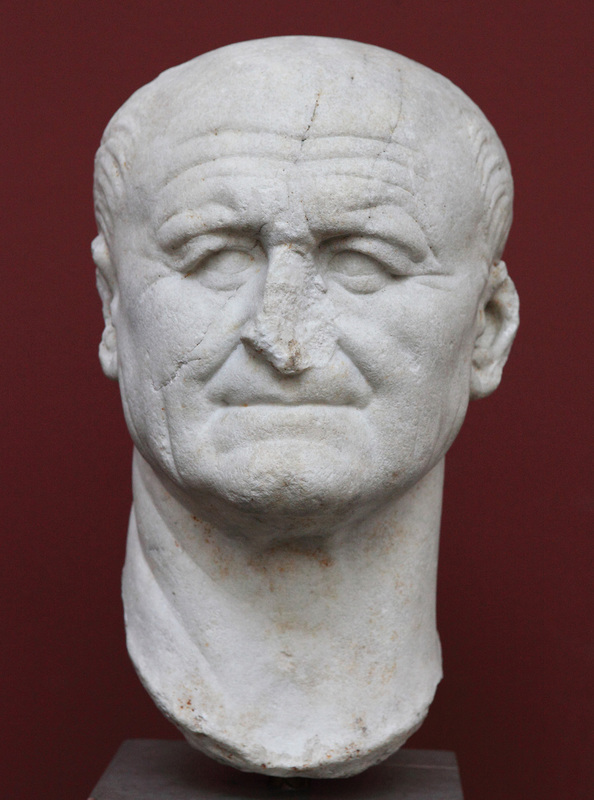Copenhagen Vespasian
Title
Copenhagen Vespasian
Date
70-79 CE, Flavian Period
Artist or Workshop
Unknown
Materials
Marble
Height of the work
45 cm tall
Provenience
Naples, Italy
Current Location
New Carlsberg Glyptotek in Copenhagen, Denmark
Description and Significance
Description:
This marble portrait is a veristic bust of the Roman emperor Vespasian. He is depicted in a very mature way, appearing to be about 60 years old. His nose has been broken off, his hair is very thin, and the top of his head is balding. He has heavy wrinkles along his forehead and around his chin and mouth. He has crow’s feet next his eyes, and smile lines next to his cheeks. He has no visible eyebrows, but has wrinkle lines in between where his eyebrows would meet. His lips are very thin, and his facial expression looks very serious and determined. He has a wide shaped head with very protruding sides right above his ears.
Significance:
Due to the fact that Vespasian followed the rule of Nero, a very young, headstrong, unsuccessful ruler, Vespasian chose to be depicted in a more veristic way in order to emphasize his wisdom and maturity as a ruler, and distance him self from Nero’s characteristics. Vespasian’s truthful portrayal of his age helped emphasize his military experience. His strained facial expression made him appear to be respectable, older, and accomplished. This was the complete opposite of the young and brash previous ruler. Nero’s youthfulness proved to be poor characteristic for a Roman emperor, so by emphasizing Vespasian’s age, it was more likely that he would be perceived as a more fitting ruler by the general public.
This marble portrait is a veristic bust of the Roman emperor Vespasian. He is depicted in a very mature way, appearing to be about 60 years old. His nose has been broken off, his hair is very thin, and the top of his head is balding. He has heavy wrinkles along his forehead and around his chin and mouth. He has crow’s feet next his eyes, and smile lines next to his cheeks. He has no visible eyebrows, but has wrinkle lines in between where his eyebrows would meet. His lips are very thin, and his facial expression looks very serious and determined. He has a wide shaped head with very protruding sides right above his ears.
Significance:
Due to the fact that Vespasian followed the rule of Nero, a very young, headstrong, unsuccessful ruler, Vespasian chose to be depicted in a more veristic way in order to emphasize his wisdom and maturity as a ruler, and distance him self from Nero’s characteristics. Vespasian’s truthful portrayal of his age helped emphasize his military experience. His strained facial expression made him appear to be respectable, older, and accomplished. This was the complete opposite of the young and brash previous ruler. Nero’s youthfulness proved to be poor characteristic for a Roman emperor, so by emphasizing Vespasian’s age, it was more likely that he would be perceived as a more fitting ruler by the general public.
References
Ancient Rome Website:
http://ancientrome.ru/art/artworken/img.htm?id=5233
Khan Academy Website:
https://www.khanacademy.org/humanities/ancient-art-civilizations/roman/early-empire/a/portrait-of-vespasian
University of Cambridge Website:
http://museum.classics.cam.ac.uk/collections/casts/vespasian
http://ancientrome.ru/art/artworken/img.htm?id=5233
Khan Academy Website:
https://www.khanacademy.org/humanities/ancient-art-civilizations/roman/early-empire/a/portrait-of-vespasian
University of Cambridge Website:
http://museum.classics.cam.ac.uk/collections/casts/vespasian
Contributor
Gentry Pack
Citation
Unknown, “Copenhagen Vespasian,” Digital Portrait "Basket" - ARTH488A "Ancient Mediterranean Portraiture", accessed June 6, 2025, http://classicalchopped.artinterp.org/omeka/items/show/35.
Item Relations
This item has no relations.

